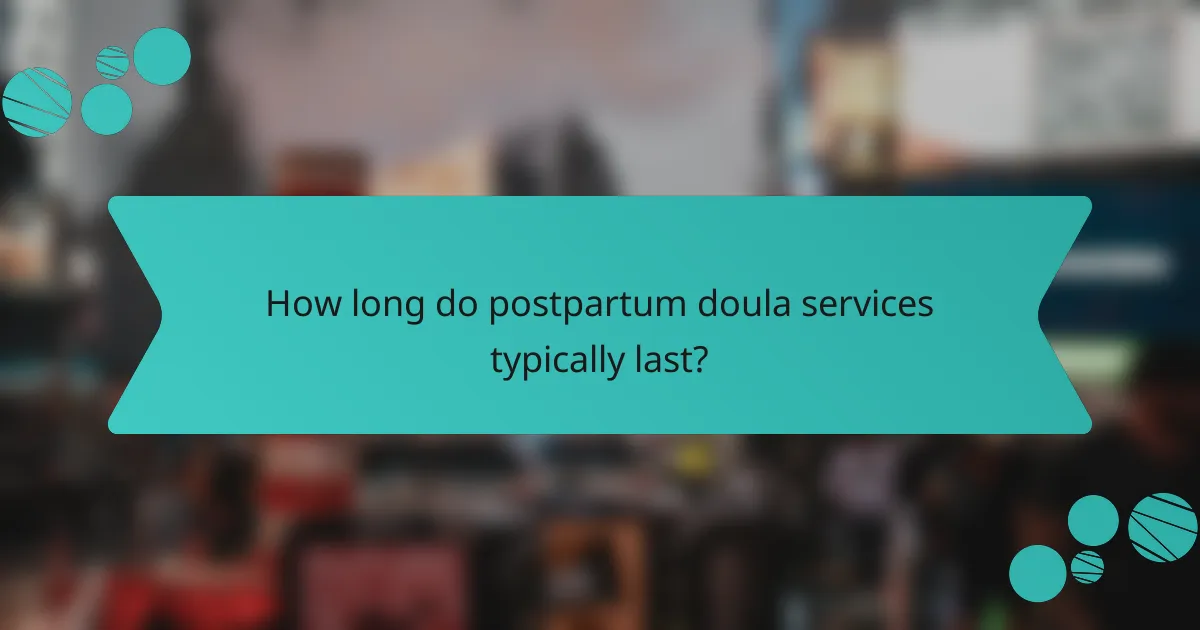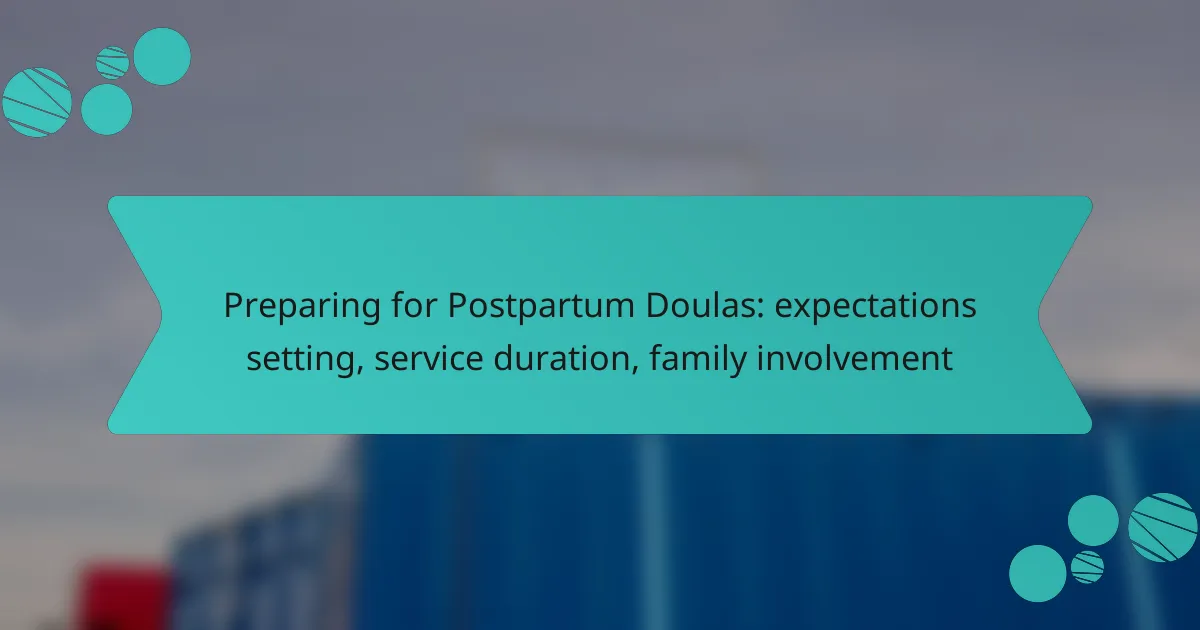Preparing for the arrival of a postpartum doula involves setting clear expectations about the support they will provide, which typically spans 2 to 6 weeks. This period is vital for new families as they navigate infant care, emotional recovery, and household management. Engaging family members in the process can enhance the overall experience, fostering collaboration and ensuring a smoother transition into parenthood.

What should I expect from postpartum doulas in Los Angeles?
Postpartum doulas in Los Angeles provide essential support to new families, focusing on infant care, emotional recovery, and household management. Their services typically last from a few weeks to several months, depending on individual family needs and circumstances.
Support with infant care
Postpartum doulas assist with various aspects of infant care, including diaper changes, bathing, and soothing techniques. They can help parents learn to recognize their baby’s cues, which can ease anxiety and build confidence in new caregivers.
Many doulas also offer practical tips for establishing a sleep routine and managing feeding schedules, which can be crucial in the early weeks. This support allows parents to focus on bonding with their newborn while receiving guidance on best practices.
Emotional and physical recovery assistance
Postpartum doulas provide emotional support to help new parents navigate the challenges of early parenthood. They can offer a listening ear and practical advice, helping families cope with the emotional ups and downs that often accompany this period.
In addition to emotional support, doulas can assist with physical recovery by suggesting gentle exercises and self-care practices. They can help identify signs of postpartum depression and encourage seeking professional help if needed.
Guidance on breastfeeding
Many postpartum doulas are trained in breastfeeding support and can help mothers establish a successful nursing routine. They provide tips on proper latch techniques, positioning, and frequency of feedings, which can significantly impact breastfeeding success.
Doulas can also assist with troubleshooting common breastfeeding challenges, such as engorgement or low milk supply, and connect families with lactation consultants if more specialized help is required.
Household management help
Postpartum doulas can assist with household tasks, allowing new parents to focus on their baby and recovery. This may include light housekeeping, meal preparation, and laundry, which can alleviate some of the stress during this transition period.
By managing these tasks, doulas help create a more organized and supportive environment, making it easier for families to adjust to their new roles. This support can be particularly beneficial in the first few weeks when parents are often overwhelmed.
Education on newborn care
Postpartum doulas provide valuable education on newborn care, covering topics such as safe sleep practices, diapering, and recognizing developmental milestones. This knowledge empowers parents to feel more competent and confident in their caregiving abilities.
They can also offer resources and recommendations for local parenting classes or support groups, helping families build a community and access additional support as needed. This education is crucial for fostering a nurturing environment for the newborn.

How long do postpartum doula services typically last?
Postpartum doula services usually last between 2 to 6 weeks, depending on the family’s needs and preferences. This duration allows families to receive adequate support during the crucial early days after childbirth.
Standard service duration of 2-6 weeks
The typical duration for postpartum doula services is 2 to 6 weeks. This timeframe provides families with the opportunity to adjust to their new routines and receive guidance on infant care, feeding, and emotional support. Many families find that this period is essential for building confidence in their parenting skills.
During this time, doulas can assist with household tasks, offer educational resources, and provide emotional reassurance, which can be vital for new parents navigating the early stages of parenthood.
Flexible scheduling options available
Postpartum doulas often offer flexible scheduling to accommodate the unique needs of each family. This flexibility can include varying hours of service, such as daytime, evenings, or weekends, allowing families to choose what works best for them.
Some doulas may also provide on-call support, enabling families to reach out for assistance as needed. This adaptability helps ensure that families receive the support they require when they need it most.
Hourly support versus full-day packages
Families can choose between hourly support and full-day packages based on their specific needs and budget. Hourly support typically allows for shorter, more focused sessions, which can be ideal for families looking for occasional help or specific tasks.
Full-day packages, on the other hand, provide comprehensive assistance throughout the day, which can be beneficial for families needing more extensive support. It’s important to assess your family’s requirements and budget to determine the best option for your situation.

How can family members be involved with postpartum doulas?
Family members can play a crucial role in supporting postpartum doulas by participating in care routines, sharing responsibilities, and undergoing training. Their involvement not only enhances the care provided but also fosters a collaborative environment for the new family dynamics.
Training for family members
Training for family members can significantly improve their ability to support the postpartum process. Doulas often provide workshops or resources that cover essential topics such as infant care, emotional support, and household management. This training helps family members feel more confident and prepared to assist the new parents.
Consider scheduling a few sessions where family members can learn practical skills, such as diapering, soothing techniques, and meal preparation. This hands-on experience can be invaluable in easing the transition into parenthood.
Encouragement of shared responsibilities
Encouraging shared responsibilities among family members helps distribute the workload during the postpartum period. This approach can alleviate stress for new parents, allowing them to focus on bonding with their baby. Family members can take on tasks such as cooking, cleaning, or running errands.
Establishing a clear plan for who does what can prevent misunderstandings. A simple checklist or schedule can help ensure that all necessary tasks are covered and that everyone knows their roles.
Involvement in care routines
Involving family members in care routines is essential for creating a supportive environment. This can include participating in activities like bathing the baby, feeding, or even taking turns holding the infant. Such involvement fosters a sense of connection and shared joy among family members.
It’s beneficial to encourage family members to ask questions and learn from the doula about best practices in infant care. This not only enhances their skills but also builds a stronger support network for the new parents.

What are the prerequisites for hiring a postpartum doula?
Before hiring a postpartum doula, it’s essential to understand your specific needs and preferences, as well as to research and interview potential candidates. This preparation ensures you find a doula who aligns with your family’s values and can provide the necessary support during the postpartum period.
Understanding your needs and preferences
Identifying your needs and preferences is the first step in hiring a postpartum doula. Consider what type of support you require, such as emotional guidance, practical help with newborn care, or assistance with household tasks. Each family’s situation is unique, so take time to reflect on what would benefit you the most.
Additionally, think about your preferred communication style and whether you want someone who shares similar parenting philosophies. This alignment can enhance the overall experience and ensure a smoother transition into parenthood.
Researching local doulas in California
When searching for postpartum doulas in California, start by looking at local directories and community resources. Websites like DoulaMatch.net or local parenting groups can provide a list of qualified professionals in your area. Pay attention to their qualifications, experience, and any specialties they may have.
Consider reaching out to friends or family for recommendations, as personal experiences can offer valuable insights. It’s also beneficial to check online reviews and testimonials to gauge the satisfaction of previous clients.
Interviewing potential candidates
Once you have a shortlist of potential doulas, schedule interviews to assess their compatibility with your family. Prepare a list of questions that cover their experience, approach to postpartum care, and availability. This discussion will help you understand how they can meet your specific needs.
During the interview, pay attention to how comfortable you feel with the candidate. A good rapport is crucial, as the doula will be a part of your intimate family environment. Don’t hesitate to ask for references and follow up with them to gain further insight into the doula’s work ethic and effectiveness.

What are the costs associated with postpartum doula services in California?
The costs for postpartum doula services in California typically range from $30 to $75 per hour, depending on the doula’s experience and the services offered. Many doulas offer package deals that can reduce the overall cost, making it more accessible for families.
Understanding service pricing
Postpartum doula pricing can vary significantly based on factors such as location, experience, and the specific services provided. Some doulas may charge a flat fee for a set number of hours, while others may offer hourly rates. It’s essential to clarify what services are included in the price, such as meal preparation, infant care, or emotional support.
Duration of services
Postpartum doulas typically provide support for a few hours each day, with services lasting from a few weeks to several months, depending on the family’s needs. Most families find that 20 to 40 hours of support over a month is beneficial, allowing for a smoother transition into parenthood.
Family involvement
Family involvement is crucial when working with a postpartum doula. Doulas encourage family members to participate in care routines, which helps build confidence and strengthens family bonds. Open communication about expectations and roles can enhance the overall experience for everyone involved.
